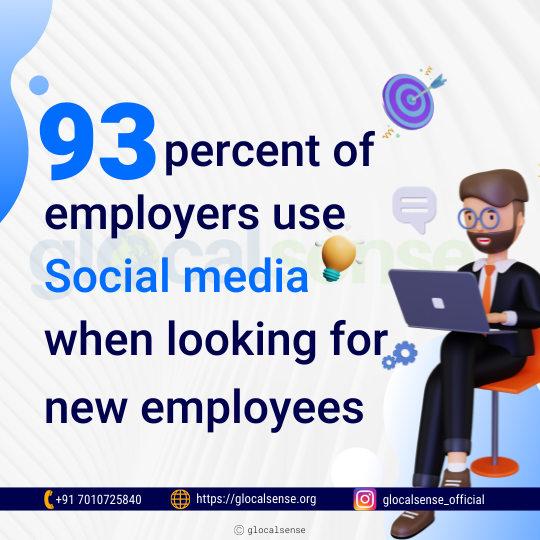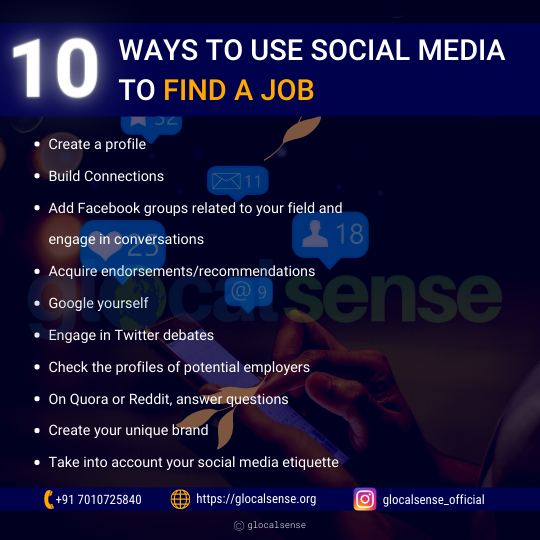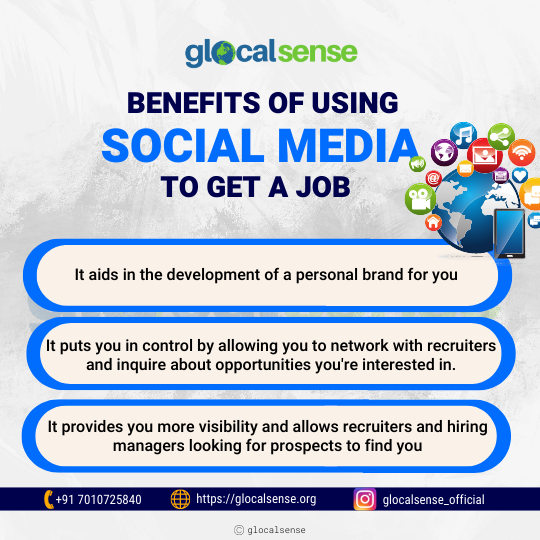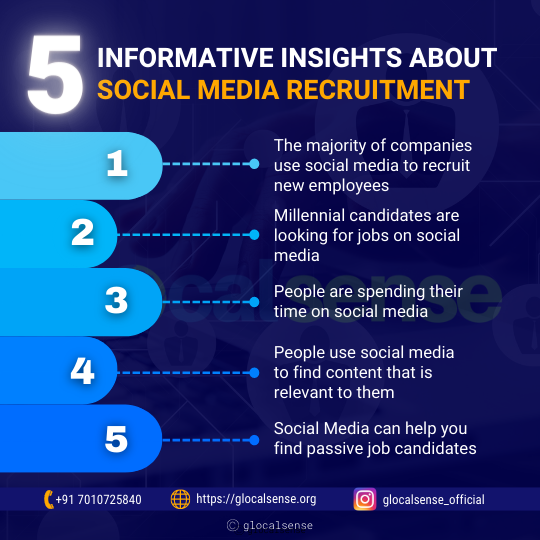In today’s world, A job seeker’s internet presence is critical to their career advancement. How job seekers depict themselves on social media platforms such as Facebook, Twitter, Instagram, and LinkedIn can help or hinder their chances of securing the desired employment. Job seekers can’t afford to ignore their online presence, with 79 percent of Americans utilizing digital platforms (including 90 percent of adults aging 18 to 29) and 70 percent of recruiters using those platforms to scan applicants.
We looked at the most recent information on using social media in the recruiting and hiring processes. The following takeaways may assist potential job seekers in gaining an edge over the competition:
- Write career-related posts regularly. According to the statistics, employers want to hire someone involved in their profession both inside and outside the office.
- Even if you aren’t actively looking for a job, keep your LinkedIn page up to date. Recruiters adore LinkedIn, and keeping your profile up to date means less effort when you’re ready to resume your job search. Remember that the information on LinkedIn should always correspond to the information on your resume and cover letter.
- Examine your social media history for information that is offensive or improper. Even if your profile is hidden, you will be in trouble when your HR department sees inappropriate posts from your past.
Most organizations and recruitment agencies use social media to find candidates, so making sure it’s up to the mark should be part of your job search strategy.
Online social networking sites have evolved into an essential forum for promoting your skills and allowing you to showcase your social brand, network with people online, identify job opportunities, and convert those leads into real-life job opportunities.
Your resume is usually only seen by those you have shared it with effectively or through recruiters who have been required to pay for access to a recruitment website’s candidate database.
So, with the help of social media sites in your job search, you can raise the visibility of your profile and be seen by a larger audience. It makes your skills and experience available to the public and allows you to network online with professionals from various industries.
Ways to Use Social Media to Find a Job
Social media sites are frequently viewed as a primary driver in communications, allowing us to keep in touch with many people with the same industry aspect while making new connections. With that in mind, it makes sense to take advantage of the enormous potential that social media offers to find a new job role.

Using social media to find a job can be very effective, and studies show that 93 percent of employers use social media when looking for new employees. The following suggestions can assist you in optimizing your social media network so that recruiters can easily find it:
1. Create a profile
LinkedIn can be the most active medium for recruitment activity. Creating an eye-catching LinkedIn profile is essential in learning how to use social media to get a job. Fill out your profile by including:
- Your educational certificates
- Your location
- A refined headline and summary
- The latest profile picture
- Any notable skills you have that are relevant to what you want to do
- Your most recent roles, as well as a concise explanation of your responsibilities, strengths, and achievements
If you have an online resume, do include a link to it.

2. Build Connections
The people in your network have the potential to make or break your success. The power of social networking sites lies in surrounding yourself with the right people. After completing your professional profile, search for former or current co-workers, managers, or supervisors.
You can also include college friends and friends who work in similar fields. Building strong connections will aid in the development of a strong professional network. A former colleague who has recently started a new career may be able to inform you of any openings and assist you in getting your foot in the door.
You might also connect with strangers if you realize they are in the same region. But, again, make your plea for a relationship precise and personal.
3. Add Facebook groups related to your field and engage in conversations
While LinkedIn may be the go-to social media platform for networking, Facebook is also a great place to grow your professional network.
Joining Facebook groups and participating in discussions is an efficient approach to meeting other professionals in your field.
Joining an engineering organization, for example, would give you access to other engineers’ knowledge, networking opportunities, and potentially career chances or job openings.
4. Acquire endorsements/recommendations
If you haven’t used LinkedIn’s endorsement mechanism, it may be highly worth exploring.
You can submit personal testimonials about your work and skills in the endorsements area. Asking for endorsements may seem unusual at first, but think of it as the occasional job reference you get for your CV.
To incorporate favorable reviews on your LinkedIn page, you can request endorsements from people you know (e.g., your previous manager, clients, or even friends). Recruiters and hiring managers will see endorsements as a strong indicator of reliability and authenticity.
5. Google yourself
According to the survey from The Manifest, many companies reject candidates after reviewing their social media presence.
To obtain how your online presence would appear from the outside, Google your social media usernames.
Clean up anything that can frighten potential recruiters away. This method might be anything from old incriminating images on Facebook to furious or overtly political tweets that you’ve forgotten about.
You can also utilize your social media privacy settings to hide anything you don’t want to be seen by the public.
6. Engage in Twitter debates
Making valuable contributions on Twitter is another method to use social media during your job search.
Join the conversation by searching for popular hashtags and trends in your field. Anyone searching for that trend will notice it, and it will help you position yourself as an industry expert.
You should also follow and interact with industry thought leaders. This way of engagement will aid in the development of relationships with specialists in your sector and be noticed by hiring managers and recruiters.
Because frequently linked trending issues are to global events, it’s essential to keep up with what’s going on in your business.
You can also look for tweets on essential projects or industry advancements and retweet anything that interests you. In addition, Twitter’s retweet with quote feature allows you to share insightful messages while also adding your comments.
7. Check the profiles of potential employers
Considering the scope of social media, you might want to limit your job search to a few companies that specialize in your interests.
Do look at their website, blog, and social media accounts. You’ll acquire the most up-to-date information and discover more about their company culture.
You can utilize social media to actively engage with a firm you want to work for if you have a specific firm targeted. First, make logical and helpful comments on their postings regularly. Then, share their content to get it in front of a larger audience.
8. On Quora or Reddit, answer questions
For experts in any field, forums like Quora and Reddit may be a wealth of information. These platforms are not just used to expand your professional knowledge but also to position yourself as a thought leader.
People use Quora and Reddit to find information, and you can see that many users have posted a question connected to your niche. You can also establish yourself as an industry expert by responding to these questions.
It’s best if you can answer as many questions as possible. It could help you gain recognition from other specialists in your field.
When users type the questions they’ve answered into search engines, your responses may appear in the results.
9. Create your unique brand
Now it’s time to shine and develop a brand on your social media profiles. First, create a personal LinkedIn brand to help you build your professional reputation.
Update the professional certificates in your LinkedIn profile’s skills section. Additionally, mention all of your accomplishments and work experience on your profile so that future employers can quickly evaluate if you’d be a good fit for their organization.
10. Take into account your social media etiquette
The key to proper social media etiquette is handling your language and indulging in positive actions that can help promote yourself.
Remember to follow standard business procedures and present yourself as competent and experienced in your sector.
Finally, on LinkedIn, and other non-personal social media platforms, avoid expressing personal ideas such as politics; instead, strive to keep your profile as business-focused as possible.
Benefits of using social media to get a job
- It aids in the development of a personal brand for you.
- It puts you in control by allowing you to network with recruiters and inquire about opportunities you’re interested in.
- It provides you more visibility and allows recruiters and hiring managers looking for prospects to find you.

5 Informative Insights About Social Media Recruitment
These compelling statistics demonstrate the advantages of social media recruitment for assembling the most incredible team and how social media can assist you in finding top talent for the organization from the company’s perspective.

- The majority of companies use social media to recruit new employees
According to a survey, at least 84 percent of businesses are currently using social media for recruitment, with 9 percent aiming to do so shortly. Organizations that don’t want to be left behind or out-hired by competitors should also take advantage of the trend. Creating social media rules is a wonderful place to start when it comes to starting internal and external social media initiatives.
2. Millennial candidates are looking for jobs on social media
According to a report by the Aberdeen Group, Millennials are redefining social recruitment techniques: A social networking site was used by 73 percent of millennials (18-34 years old) to find their last job. So, if you want to reach out to the workforce’s newest and most motivated members, make sure you choose platforms that appeal to them.
3. People are spending their time on social media
According to studies, people spend a significant amount of time on social media. If current trends in global social media consumption continue, the average person will spend more than five years on social media. As a result, it’s a good idea to recruit where people spend their time.
4. People use social media to find content that is relevant to them
People who wish to find branded content that is attractive to them might use social media. According to Marketing Sherpa, at least 58 percent of American consumers use social media to follow brands.
Suppose someone finds your firm (or available employment at your company) via social media. It might largely be because they actively sought it out or displayed interest in relevant/related topics or groups. As a result, if someone engages with you on social media for a future job position, they’re likely interested in your branded content or can relate to your corporate culture, making them superior candidates.
5. Social Media Can Help You Find Passive Job Candidates
The best prospects aren’t always those who are actively looking for work. Perhaps they already have a job (but could be enticed away), or they aren’t looking for the type of work you’re offering. However, even if they aren’t actively looking for work, passive job candidates can often be the best fit for a position, and social media has shown to be a great place to find them. According to an SHRM survey, 82 percent of businesses now successfully use social media to acquire passive job candidates.
You can use social media recruiting to showcase your company culture, reach a larger talent pool, and connect with your ideal candidates. As Gen Z and Millennials become more prevalent in the workforce, social media will become even more valuable to recruiters.
